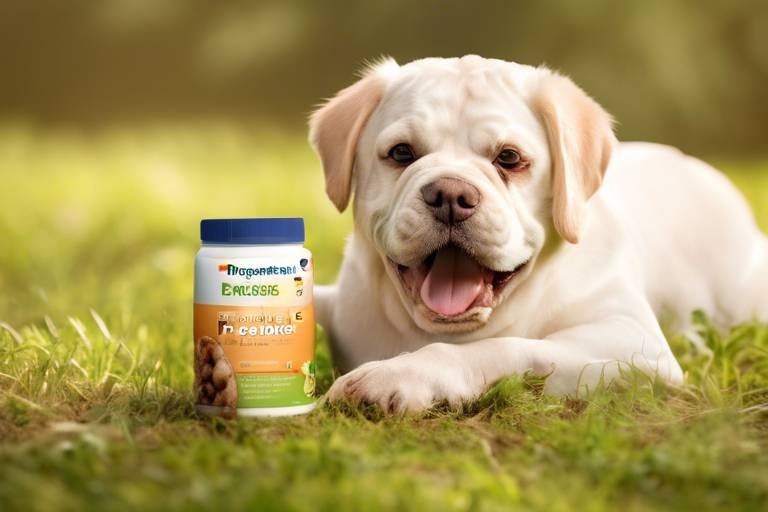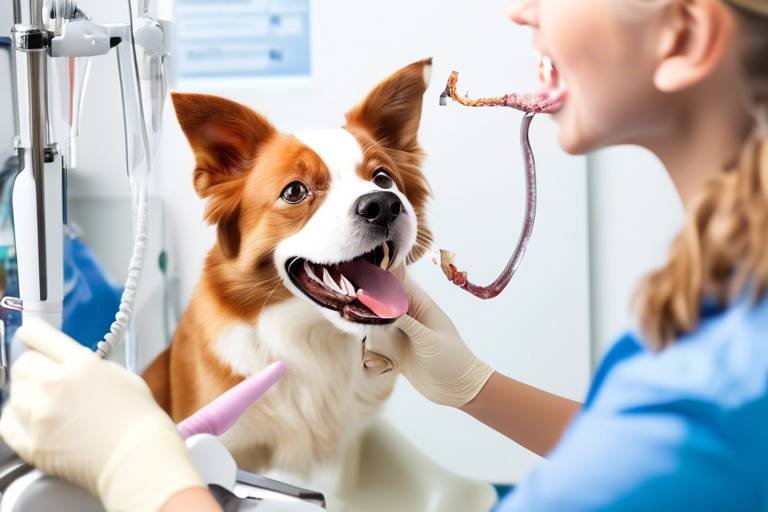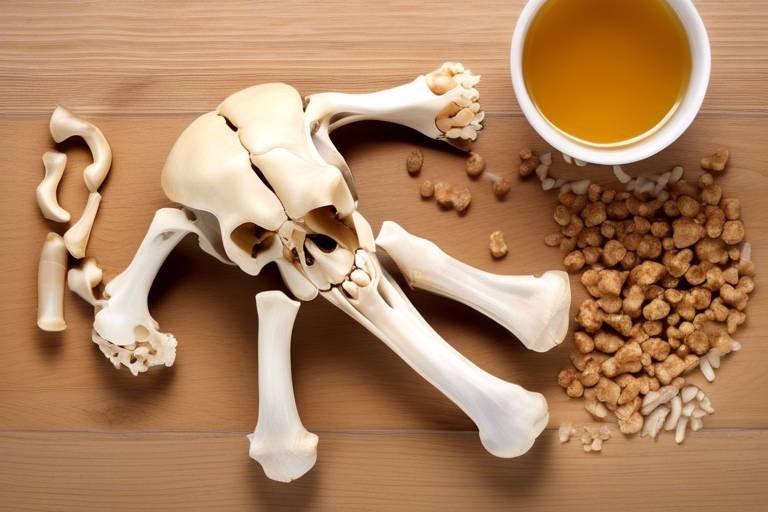Nutritional Supplements for Pets - Do They Work?
When it comes to our furry friends, we all want to ensure they lead healthy and happy lives. But with so many nutritional supplements on the market, pet owners often find themselves asking, "Do these supplements actually work?" The answer isn't a simple yes or no. It varies based on several factors, including the type of supplement, the health needs of the pet, and the quality of the product itself. In this article, we will explore the efficacy of these supplements, their benefits, potential risks, and the scientific evidence that backs them up. By the end, you’ll be better equipped to make informed choices for your beloved pets.
Understanding the role of nutrition is crucial for pet owners. Just like humans, pets require a balanced diet to maintain their health, support growth, and increase longevity. A well-rounded diet provides essential nutrients, but sometimes our pets may need a little extra help. This is where nutritional supplements come into play. They can enhance a pet's nutritional intake, particularly in cases where their regular diet falls short. Imagine trying to build a house without the right tools; it’s the same concept with our pets. Proper nutrition is the foundation of their health, and supplements can serve as the tools that help build that foundation stronger.
There are various types of nutritional supplements available for pets, each serving a specific purpose. Understanding these can help pet owners make informed decisions tailored to their pets' needs. Here are some common categories:
- Vitamins: Essential for numerous bodily functions.
- Minerals: Crucial for bone health and metabolic processes.
- Fatty Acids: Important for skin, coat, and joint health.
- Probiotics: Beneficial for digestive health and immunity.
Each type of supplement can contribute to a pet's health in different ways, and knowing which ones to consider is vital for every pet owner.
Vitamins and minerals are essential for maintaining various bodily functions in pets. For instance, vitamins A, D, and E are crucial for vision, bone health, and immune function. When pets suffer from deficiencies in these vitamins, it can lead to serious health issues. Supplementing these nutrients can help correct deficiencies and support overall well-being, especially in pets with specific health conditions. Think of vitamins and minerals as the fuel that keeps your pet's engine running smoothly. Without the right fuel, that engine can sputter and stall.
Many pet diets, especially those that are homemade or not specifically formulated, can lack essential vitamins. Some common deficiencies include:
- Vitamin A: Important for vision and immune function.
- Vitamin D: Crucial for calcium absorption and bone health.
- Vitamin E: Acts as an antioxidant and supports skin health.
Recognizing these deficiencies can help pet owners make informed decisions about supplementation to improve their pet's health.
Minerals like calcium and phosphorus are vital for bone health. Supplementing these minerals can help prevent conditions such as osteoporosis and support proper growth in young pets. Just as a sturdy foundation is necessary for a building to stand tall, minerals provide the structural support that keeps our pets healthy and strong.
Fatty acids, particularly omega-3 and omega-6, play a significant role in skin, coat, and joint health. Adding these supplements can enhance your pet's quality of life and reduce inflammation. Think of them as the oil that keeps your pet's joints moving smoothly and their coat looking shiny and healthy. Without enough fatty acids, your pet might experience dry skin, joint pain, and overall discomfort.
Research on the effectiveness of pet supplements is ongoing. Understanding the scientific backing can help pet owners determine which supplements are beneficial and worth considering for their pets. For example, studies have shown that certain supplements can have a positive impact on various health issues.
Many studies have focused on glucosamine and chondroitin for joint health. Evidence suggests that these supplements can help manage arthritis and improve mobility in aging pets. It’s like giving your pet a little extra spring in their step, allowing them to enjoy life more fully.
Probiotics are gaining attention for their role in gut health. Research indicates that these supplements can enhance digestion, boost immunity, and improve overall health in pets. Think of probiotics as the friendly bacteria that help keep your pet's digestive system running like a well-oiled machine.
While supplements can offer benefits, they also come with potential risks. Understanding these risks is essential for pet owners to avoid adverse effects and ensure safe supplementation. Just like with any good thing, moderation is key.
Giving pets too many supplements can lead to toxicity and health issues. It's crucial for pet owners to follow recommended dosages and consult with veterinarians before starting any supplement regimen. Think of it this way: too much of a good thing can quickly turn sour.
Nutritional supplements can interact with prescription medications. Pet owners must be aware of these interactions to prevent adverse effects and ensure their pets receive safe and effective treatment. Always consult your vet before introducing new supplements into your pet's diet.
Q: Are supplements necessary for all pets?
A: Not all pets require supplements. A balanced diet can provide sufficient nutrients for many pets. However, certain health conditions or dietary deficiencies may warrant supplementation.
Q: How do I know if my pet needs a supplement?
A: Consult your veterinarian. They can assess your pet's health and dietary needs to determine if supplements are necessary.
Q: Can I give my pet human supplements?
A: No, human supplements can be harmful to pets. Always use products specifically formulated for animals.

The Importance of Nutrition in Pet Health
When it comes to our furry friends, nutrition is the cornerstone of their health and well-being. Just like us, pets require a balanced diet that provides all the essential nutrients they need to thrive. Think of nutrition as the fuel for a car; without the right type of fuel, the car won’t run smoothly, and the same goes for our pets. A proper diet not only supports their growth and development but also plays a crucial role in preventing disease and enhancing their quality of life.
Many pet owners may wonder, "What exactly does a balanced diet consist of?" It includes a mix of proteins, fats, carbohydrates, vitamins, and minerals. Each of these components serves a specific purpose in maintaining health. For example, proteins are vital for building and repairing tissues, while fats provide energy and support cell function. Vitamins and minerals are essential for various biochemical reactions in the body, contributing to everything from a healthy immune system to strong bones.
Moreover, as pets age, their nutritional needs can change dramatically. Older pets may require diets that are lower in calories but higher in certain nutrients to combat age-related health issues. For instance, senior dogs might benefit from joint-supporting supplements, while cats may need more protein to maintain muscle mass. This is where nutritional supplements come into play, acting as a bridge to fill any gaps in their diet.
It’s also important to note that not all pets are created equal. Factors such as breed, size, age, and health status can affect their nutritional requirements. For example, a Great Dane has different dietary needs compared to a Chihuahua. Therefore, understanding your pet's unique requirements is essential for making informed decisions about their diet and any necessary supplements.
In summary, proper nutrition is vital for your pet's overall health and longevity. It’s not just about filling their bowl; it’s about providing them with the right ingredients to lead a happy, healthy life. As pet owners, we have the responsibility to ensure our companions receive a balanced diet, and that often means considering the role of supplements to enhance their nutritional intake.
- What are the signs of poor nutrition in pets? Look for symptoms like lethargy, poor coat condition, and weight loss.
- Can I give my pet human supplements? It's crucial to consult with a veterinarian before giving your pet any human supplements, as some can be harmful.
- How do I know if my pet needs supplements? A vet can evaluate your pet's diet and health status to determine if supplements are necessary.

Types of Nutritional Supplements
When it comes to ensuring our furry friends lead happy and healthy lives, nutritional supplements can play a pivotal role. But with so many options available, it’s essential to understand the different types of supplements that can benefit your pet. Each category of supplement serves a unique purpose, helping to fill nutritional gaps and enhance overall health. Let's dive into some of the most common types of nutritional supplements for pets, shall we?
One of the most prevalent categories includes vitamins and minerals. These are crucial for maintaining various bodily functions. Just like humans, pets can suffer from deficiencies in essential vitamins such as A, D, and E. For instance, vitamin A is vital for vision and immune function, while vitamin D is crucial for calcium absorption. If a pet's diet lacks these vitamins, it can lead to serious health issues. Supplementing these nutrients not only helps to correct deficiencies but also supports overall well-being, especially in pets with specific health conditions.
Next up, we have fatty acids, particularly omega-3 and omega-6. These essential fatty acids are like the *superheroes* of pet nutrition. They work wonders for skin, coat, and joint health. If you've ever noticed your pet scratching or having a dull coat, it might be time to consider adding fatty acid supplements to their diet. These supplements can help reduce inflammation and improve skin conditions, leading to a happier and more comfortable pet.
Another important category is probiotics. These beneficial bacteria are gaining attention for their role in supporting digestive health. Just like us, pets can suffer from digestive issues, and probiotics can help enhance digestion, boost immunity, and promote overall health. Imagine probiotics as tiny warriors fighting off the bad bacteria in your pet's gut, ensuring that their digestive system runs smoothly.
To give you a clearer picture of these various supplements, here’s a quick summary in table format:
| Type of Supplement | Benefits |
|---|---|
| Vitamins | Support immune function, vision, and overall health. |
| Minerals | Essential for bone health and metabolic processes. |
| Fatty Acids | Improve skin and coat health; reduce inflammation. |
| Probiotics | Enhance digestion and boost immune function. |
In summary, understanding the types of nutritional supplements available can significantly impact your pet's health. Each supplement type serves a specific purpose, catering to various needs and conditions. As responsible pet owners, it's crucial to evaluate your pet's diet and consider incorporating these supplements wisely. Remember, a well-nourished pet is a happy pet!
Q: Are nutritional supplements necessary for all pets?
A: Not all pets require supplements. It's essential to assess your pet's diet and health needs. Consult with your veterinarian to determine if supplementation is necessary.
Q: Can I give my pet human supplements?
A: It's not advisable to give pets human supplements without consulting a veterinarian, as some ingredients can be harmful to animals.
Q: How do I know if my pet needs supplements?
A: Look for signs of deficiency, such as poor coat condition, lethargy, or digestive issues. A veterinarian can also help assess your pet's nutritional needs.
Vitamins and Minerals
Nutritional supplements, particularly vitamins and minerals, play an essential role in maintaining the health and vitality of our beloved pets. Just like humans, pets require a balanced intake of these nutrients to support various bodily functions, from their immune system to their skin health. However, the reality is that many commercial pet foods may not provide all the necessary vitamins and minerals in adequate amounts. This is where supplements come into play, helping to fill in the nutritional gaps.
Vitamins are organic compounds that are crucial for numerous biochemical processes in the body. They are typically classified into two categories: water-soluble and fat-soluble. Water-soluble vitamins, such as the B vitamins and vitamin C, are not stored in the body and need to be consumed regularly. On the other hand, fat-soluble vitamins, including vitamins A, D, E, and K, can be stored in the body’s fatty tissues, making it possible for pets to experience toxicity if consumed in excess.
Minerals, which are inorganic elements, also play a vital role in your pet's health. They are classified into two groups: macrominerals and microminerals. Macrominerals, such as calcium, phosphorus, and magnesium, are needed in larger amounts, while microminerals, like zinc, copper, and selenium, are required in smaller quantities but are equally essential for health.
| Vitamin/Mineral | Function | Deficiency Symptoms |
|---|---|---|
| Vitamin A | Supports vision and immune function | Poor vision, skin issues |
| Vitamin D | Regulates calcium and phosphorus levels | Weak bones, dental problems |
| Calcium | Essential for bone health | Bone deformities, muscle spasms |
| Zinc | Supports immune function and skin health | Skin lesions, slow healing |
Recognizing common vitamin and mineral deficiencies in pets is crucial for making informed decisions about supplementation. For instance, many pet owners may not realize that their furry friends could be lacking in vitamin A, which is vital for maintaining healthy vision and skin. Similarly, a deficiency in calcium can lead to severe skeletal issues, particularly in growing puppies and kittens.
While it's tempting to think that more is better, it's important to remember that over-supplementation can lead to toxicity and health complications. Therefore, consulting with a veterinarian before introducing any new vitamin or mineral supplements into your pet's diet is essential. Your vet can guide you on the appropriate types and dosages based on your pet's specific needs.
In conclusion, ensuring that your pet receives a balanced intake of vitamins and minerals is fundamental to their overall health. By understanding the role of these nutrients and recognizing potential deficiencies, you can make better choices for your pet's diet and supplementation needs.
- Can I give my pet human vitamins? No, human vitamins may not be safe for pets and can lead to toxicity.
- How do I know if my pet needs supplements? Consult your veterinarian for a dietary assessment and recommendations.
- Are there side effects to pet supplements? Yes, over-supplementation or incorrect dosages can have adverse effects.
Common Vitamin Deficiencies in Pets
When it comes to our furry friends, vitamin deficiencies can be a sneaky culprit behind various health issues. Just like humans, pets require a balanced intake of vitamins to maintain their vitality and overall well-being. Unfortunately, many commercial pet foods may not provide all the essential nutrients, leading to deficiencies that can affect your pet's health in significant ways. For instance, vitamins A, D, and E are often found lacking in the diets of our pets. Let's take a closer look at these critical vitamins and what they contribute to your pet's health.
Vitamin A is crucial for maintaining healthy vision, immune function, and skin health. Pets that don't get enough Vitamin A may experience issues like poor night vision or skin problems. Likewise, Vitamin D plays a vital role in calcium absorption, making it essential for bone health. A deficiency in this vitamin can lead to weak bones, especially in growing puppies and kittens. Lastly, Vitamin E acts as an antioxidant, protecting cells from damage and supporting skin and coat health. Without adequate Vitamin E, pets may suffer from skin conditions and a dull coat.
Here’s a quick overview of the common vitamin deficiencies and their effects:
| Vitamin | Common Effects of Deficiency |
|---|---|
| Vitamin A | Poor vision, skin issues, weakened immune response |
| Vitamin D | Weak bones, poor calcium absorption, growth issues |
| Vitamin E | Skin problems, dull coat, cell damage |
As a pet owner, it's essential to recognize the signs of these deficiencies. If your pet shows symptoms such as lethargy, changes in appetite, or noticeable skin issues, it might be time to consult with your veterinarian. They can recommend appropriate dietary adjustments or supplements to ensure your pet receives all the necessary nutrients. Remember, a well-nourished pet is a happy pet!
- What are the signs that my pet may have a vitamin deficiency? Look for symptoms like lethargy, poor coat condition, and changes in appetite or behavior.
- Can I give my pet human vitamins? No, human vitamins can be toxic to pets. Always consult your vet for pet-specific supplements.
- How can I ensure my pet gets enough vitamins? Choose high-quality pet food and consult your vet about the need for additional supplements.
Minerals and Their Benefits
When we think about our pets' health, we often focus on the food they eat, but minerals play a crucial role in their overall well-being too. Just like us, pets need a variety of minerals to function properly. These nutrients are essential for numerous bodily processes, including bone development, nerve function, and muscle contraction. Without adequate mineral intake, our furry friends may face a range of health issues that can affect their quality of life.
Among the most important minerals for pets are calcium and phosphorus. Calcium is vital for strong bones and teeth, while phosphorus works in tandem with calcium to support healthy bone structure. In fact, the right balance of these two minerals is crucial; too much or too little of either can lead to serious health problems. For instance, a deficiency in calcium can result in conditions like osteoporosis, making bones brittle and more prone to fractures.
In addition to calcium and phosphorus, other minerals such as potassium, magnesium, and iron also contribute to your pet's health. Potassium is essential for maintaining fluid balance and proper muscle function, while magnesium supports energy production and muscle relaxation. Iron, on the other hand, is crucial for the formation of hemoglobin, which carries oxygen in the blood. A lack of iron can lead to anemia, leaving your pet feeling sluggish and weak.
To give you a clearer picture, here's a quick overview of some essential minerals and their benefits:
| Mineral | Benefits |
|---|---|
| Calcium | Supports bone health and teeth strength |
| Phosphorus | Works with calcium for strong bones |
| Potassium | Maintains fluid balance and muscle function |
| Magnesium | Supports energy production and muscle relaxation |
| Iron | Essential for oxygen transport in the blood |
It's important to note that while minerals are essential, they should be provided in the right amounts. Over-supplementation can lead to toxicity and health issues. For example, too much calcium can cause kidney problems, while excess phosphorus may lead to bone disease. Therefore, consulting with a veterinarian is crucial when considering mineral supplementation for your pet.
In conclusion, minerals are not just an afterthought in your pet's diet; they are foundational to their health and vitality. By ensuring your pet receives a balanced intake of these essential nutrients, you can help them lead a healthier, happier life.
- What are the signs of mineral deficiency in pets?
Common signs include lethargy, poor coat condition, and dental issues. - Can I give my pet human supplements?
It's best to avoid human supplements unless specifically advised by a veterinarian, as dosages and formulations differ. - How do I know if my pet needs mineral supplementation?
Consulting with your vet is the best way to determine if your pet requires additional minerals based on their diet and health status.
Fatty Acids and Their Role
When it comes to the health of our furry companions, fatty acids are often unsung heroes. These essential nutrients, particularly omega-3 and omega-6 fatty acids, play a pivotal role in maintaining overall well-being. Imagine them as the oil that keeps the engine of your pet's body running smoothly. Just like how we need healthy fats in our diet to support our heart and brain, pets also benefit tremendously from these vital fatty acids.
Omega-3 fatty acids are particularly renowned for their anti-inflammatory properties. They can help alleviate issues such as arthritis, which is common in older pets. Think of omega-3s as a soothing balm for inflamed joints, allowing your pet to move more freely and comfortably. On the other hand, omega-6 fatty acids are crucial for maintaining skin health and a shiny coat. They act almost like a protective barrier, keeping your pet's skin moisturized and preventing dryness or irritation.
Incorporating these fatty acids into your pet's diet can be done through various means. You can find them in supplements, or you might consider adding certain foods to their meals. For instance, fish oil is a popular source of omega-3s, while chicken fat is rich in omega-6s. However, it's essential to ensure that the sources are high-quality to maximize their benefits. Below is a table highlighting some common sources of fatty acids:
| Fatty Acid | Source | Health Benefits |
|---|---|---|
| Omega-3 | Fish oil, flaxseed oil | Reduces inflammation, supports joint health |
| Omega-6 | Chicken fat, sunflower oil | Improves skin health, promotes a shiny coat |
It's important to remember that while fatty acids offer numerous benefits, moderation is key. Too much of a good thing can lead to imbalance and health issues. Always consult with your veterinarian to determine the right dosage and sources of fatty acids for your pet's specific needs. By doing so, you can ensure that your furry friend enjoys all the advantages these essential nutrients have to offer, leading to a happier, healthier life.
- What are the signs that my pet might need fatty acid supplements? Look for signs like dry skin, dull coat, or joint stiffness, especially in older pets.
- Can I give my pet human fish oil supplements? While some human supplements are safe, it's best to use products specifically formulated for pets to avoid any harmful ingredients.
- How do I know the right dosage for my pet? Always consult with your veterinarian for personalized advice based on your pet's size, age, and health condition.

Scientific Evidence Supporting Supplements
When it comes to the world of nutritional supplements for pets, the buzz can be overwhelming. Many pet owners find themselves asking, "Do these supplements really work?" The truth is, scientific research is continually evolving, shedding light on the effectiveness of various supplements. As a responsible pet owner, understanding the scientific backing of these products can help you make informed decisions that could significantly improve your furry friend's health.
One of the most studied areas in pet supplementation is joint health. Many aging pets suffer from arthritis or joint pain, and supplements like glucosamine and chondroitin have gained popularity for their purported benefits. Research has shown that these compounds may help in managing arthritis symptoms, enhancing mobility, and improving the overall quality of life for older pets. A study published in the Journal of Veterinary Internal Medicine found that dogs receiving glucosamine showed a significant improvement in their ability to perform daily activities compared to those who did not receive the supplement.
Another area where scientific evidence is making waves is in the realm of probiotics. These beneficial bacteria are known for their role in gut health, and recent studies have highlighted their potential benefits for pets. Research indicates that probiotics can enhance digestion, boost the immune system, and even improve skin conditions. A study conducted by the American Journal of Veterinary Research found that dogs supplemented with probiotics showed a marked decrease in gastrointestinal issues, suggesting that these supplements can play a crucial role in maintaining a healthy digestive tract.
To provide a clearer picture, let’s take a look at some key findings from recent studies:
| Supplement Type | Key Benefits | Study Reference |
|---|---|---|
| Glucosamine & Chondroitin | Improved joint mobility and reduced arthritis symptoms | Journal of Veterinary Internal Medicine |
| Probiotics | Enhanced digestion and improved immune response | American Journal of Veterinary Research |
| Omega Fatty Acids | Improved skin and coat health, reduced inflammation | Veterinary Dermatology |
As you can see, the scientific community is actively exploring the benefits of various supplements, and the evidence is promising. However, it's essential to remember that not all supplements are created equal. Quality matters! Always look for reputable brands that provide transparency about their ingredients and have undergone rigorous testing. Consulting your veterinarian before starting any new supplement is also a wise step to ensure that it aligns with your pet's specific health needs.
In conclusion, while the evidence supporting the use of nutritional supplements for pets is growing, it’s crucial to approach supplementation with caution. Understanding what works and what doesn’t can make a world of difference in your pet’s health journey. So, keep researching, asking questions, and most importantly, stay informed!
1. Are nutritional supplements necessary for my pet?
While a balanced diet is essential, some pets may benefit from supplements, especially if they have specific health concerns or dietary deficiencies. Always consult your veterinarian for personalized advice.
2. Can I give my pet human supplements?
No, human supplements can contain ingredients that are harmful to pets. Always use products specifically formulated for pets.
3. How do I know if a supplement is effective?
Look for products backed by scientific research and consult with your veterinarian. They can help you determine what might be beneficial for your pet.
4. Are there risks associated with pet supplements?
Yes, over-supplementation can lead to toxicity and health issues. Always follow recommended dosages and consult with a veterinarian.
Studies on Joint Health Supplements
When it comes to ensuring the well-being of our furry friends, joint health is a significant concern, especially as pets age. Many pet owners have turned to joint health supplements, such as glucosamine and chondroitin, hoping to alleviate discomfort and improve mobility. But what does the science say about these supplements? Numerous studies have been conducted to assess their efficacy, and the results can be quite enlightening.
Research indicates that glucosamine, a natural compound found in cartilage, can help in the repair and maintenance of joint tissue. A systematic review published in the Journal of Veterinary Internal Medicine highlighted that glucosamine supplementation may reduce pain and improve joint function in dogs with osteoarthritis. Similarly, chondroitin sulfate, which helps maintain cartilage structure and elasticity, has shown promise in various studies. In one notable trial, dogs receiving a combination of glucosamine and chondroitin demonstrated significant improvements in their mobility compared to those on a placebo.
Furthermore, a meta-analysis of multiple clinical trials revealed that these supplements not only help in managing symptoms of arthritis but may also slow down the progression of joint degeneration. This is particularly relevant for older pets or those predisposed to joint issues, as early intervention could lead to a better quality of life. It's important to note, however, that while many studies support the use of these supplements, results can vary based on the individual pet's condition and overall health.
In addition to glucosamine and chondroitin, other ingredients like MSM (methylsulfonylmethane) and omega-3 fatty acids are gaining traction in joint health formulations. MSM is known for its anti-inflammatory properties, which can further enhance the benefits of glucosamine. On the other hand, omega-3 fatty acids, often derived from fish oil, have been shown to reduce joint inflammation, making them a valuable addition to any joint health regimen.
It's essential for pet owners to consult with their veterinarians before starting any supplement regimen. The veterinarian can provide personalized recommendations based on the pet's specific health needs and conditions. Additionally, they can help monitor any changes in the pet's health and adjust dosages as necessary.
In conclusion, while the scientific evidence supporting joint health supplements is promising, it is crucial to approach supplementation with informed caution. The benefits of glucosamine, chondroitin, and other joint health ingredients can be substantial, but they should be part of a holistic approach that includes proper diet, exercise, and regular veterinary check-ups. By doing so, pet owners can ensure their beloved companions enjoy a more active and pain-free life.
- What are the signs that my pet may need joint health supplements? Look for symptoms such as difficulty in rising, reluctance to walk or play, limping, and stiffness after resting.
- How long does it take for joint supplements to show effects? Many pet owners report improvements within a few weeks, but it can take up to several months for the full benefits to be realized.
- Are there any side effects of joint health supplements? Most pets tolerate these supplements well, but it's always best to consult your veterinarian, especially if your pet is on other medications.
- Can I give my pet human joint supplements? It's not advisable to give human supplements to pets without veterinary guidance, as dosages and ingredients may differ significantly.
Probiotics and Digestive Health
When it comes to our furry friends, their digestive health is often overlooked, yet it plays a pivotal role in their overall well-being. Just like in humans, the gut flora of pets is a complex ecosystem that requires balance to function optimally. This is where probiotics come into play. These beneficial microorganisms can significantly enhance your pet's digestive system, helping to break down food, absorb nutrients, and maintain a healthy gut environment.
Research has shown that probiotics can help alleviate digestive issues such as diarrhea, constipation, and even irritable bowel syndrome in pets. They work by restoring the natural balance of bacteria in the gut, especially after disruptions caused by antibiotics, stress, or dietary changes. Imagine your pet's gut as a bustling city; probiotics are the friendly neighbors that keep everything running smoothly, preventing chaos and disorder.
One of the most exciting aspects of probiotics is their potential to boost your pet's immune system. A healthy gut is closely linked to a strong immune response. By ensuring that your pet's gut flora is thriving, you're not just supporting their digestive health but also fortifying their defenses against illnesses. In fact, studies have indicated that pets receiving probiotics experience fewer infections and recover more quickly from illnesses.
Probiotics come in various forms, including powders, capsules, and treats, making it easier for pet owners to incorporate them into their pets' diets. However, it's essential to choose the right type and strain of probiotics tailored to your pet's specific needs. Here’s a quick overview of some common probiotic strains and their benefits:
| Probiotic Strain | Benefits |
|---|---|
| Lactobacillus acidophilus | Helps with digestion and reduces diarrhea. |
| Bifidobacterium bifidum | Supports gut health and boosts immunity. |
| Enterococcus faecium | Enhances nutrient absorption and gut balance. |
While probiotics can be a fantastic addition to your pet's diet, it's crucial to consult with your veterinarian before starting any new supplement. They can help determine the appropriate type and dosage based on your pet's health status and dietary needs. Remember, not all probiotics are created equal, and what works for one pet may not be suitable for another. Always prioritize your pet's health and safety!
- What are probiotics? Probiotics are live bacteria that are beneficial for your pet's digestive health.
- How do I know if my pet needs probiotics? If your pet experiences digestive issues or has been on antibiotics, probiotics may be beneficial.
- Can I give my pet human probiotics? It's best to use probiotics specifically formulated for pets, as human strains may not be effective or safe for them.
- How long does it take for probiotics to work? Some pets may see improvements within a few days, while others may take a few weeks to notice significant changes.

Potential Risks of Supplementation
While nutritional supplements can provide significant benefits to our furry friends, it's essential to understand that they are not without risks. Just like humans, pets can experience negative effects from inappropriate supplementation. The key is to approach supplementation with caution and a well-informed mindset. Over-supplementation, for instance, is a common concern among pet owners. Providing too many vitamins or minerals can lead to toxicity, which can manifest in various health issues. For example, excess vitamin A can cause liver damage, while too much calcium can lead to skeletal problems. Therefore, it’s crucial to adhere strictly to recommended dosages and consult with a veterinarian before introducing any new supplement into your pet's diet.
Another potential risk involves the interaction between supplements and prescription medications. Many pet owners may not realize that certain supplements can affect how medications work in their pets. For instance, omega-3 fatty acids can thin the blood, which might enhance the effects of anticoagulant medications, leading to an increased risk of bleeding. It's vital for pet owners to keep their veterinarians informed about all supplements being given to their pets to avoid such interactions. A thorough discussion can ensure that both the supplements and medications work harmoniously without causing harm.
Moreover, the quality and source of supplements can also pose risks. Not all supplements are created equal, and some may contain harmful additives or incorrect dosages. It's advisable to choose products that are manufactured by reputable companies and have undergone third-party testing. This ensures that what you are giving your pet is safe and effective. Always read labels carefully and look for certifications that indicate the product’s quality.
In summary, while nutritional supplements can play a beneficial role in your pet's health, being aware of the potential risks is crucial. Regular veterinary consultations, adhering to recommended dosages, and choosing high-quality products can help mitigate these risks. Remember, your pet's health is a partnership, and informed decisions are the cornerstone of that relationship.
- What should I do before starting my pet on supplements? Always consult with your veterinarian to determine the right supplements and dosages for your pet's specific needs.
- Can supplements replace a balanced diet? No, supplements are meant to complement a balanced diet, not replace it. A well-rounded diet is essential for your pet's overall health.
- How can I tell if my pet needs supplements? Signs such as poor coat condition, lethargy, or specific health issues may indicate a need for supplements. A vet can provide guidance based on your pet's health status.
- Are all supplements safe for pets? Not all supplements are safe; it's crucial to choose high-quality products and consult with a veterinarian to avoid harmful ingredients.
Over-Supplementation Concerns
When it comes to our furry friends, the saying "more is better" doesn't always hold true, especially in the world of nutritional supplements. Over-supplementation can lead to serious health issues for pets, making it crucial for pet owners to be vigilant about how many supplements they are giving their beloved companions. Just like humans, pets can suffer from toxicity if they consume too many vitamins or minerals, leading to a range of health problems that could have been easily avoided.
For instance, fat-soluble vitamins such as A, D, E, and K can accumulate in a pet's body, potentially reaching toxic levels. Symptoms of vitamin toxicity can include vomiting, lethargy, and even organ damage in severe cases. Similarly, minerals like calcium and phosphorus, while essential for bone health, can cause issues like kidney damage or hypercalcemia if given in excess. It's a bit like giving your pet a double dose of their favorite treat; while it might seem harmless, it could lead to an upset stomach or worse.
To ensure safe supplementation, pet owners should always adhere to the recommended dosages provided by veterinarians or on the product labels. Consulting with a vet before starting any new supplement regimen is essential. They can provide tailored advice based on your pet's unique health needs, age, and dietary habits. Remember, just because a supplement is available over the counter doesn't mean it's safe for every pet.
Moreover, it's important to consider the cumulative effect of multiple supplements. If your pet is already receiving a balanced diet and perhaps a multivitamin, adding additional supplements without professional guidance can lead to over-supplementation. Here’s a quick summary of what to keep in mind:
| Supplement Type | Potential Risks of Over-Supplementation |
|---|---|
| Vitamins (A, D, E) | Toxicity, organ damage, lethargy |
| Minerals (Calcium, Phosphorus) | Kidney damage, hypercalcemia |
| Fatty Acids | Diarrhea, weight gain |
| Probiotics | Digestive upset, bloating |
In conclusion, while supplements can be beneficial for pets, caution is key. Always monitor your pet's response to any new supplement and keep an eye out for any unusual behaviors or symptoms. If something doesn’t seem right, don’t hesitate to reach out to your veterinarian. After all, maintaining your pet's health is a partnership, and being informed is the first step towards ensuring their well-being.
- What are the signs of over-supplementation in pets? Look for symptoms like vomiting, diarrhea, lethargy, or unusual behavior. If you notice any of these, consult your veterinarian immediately.
- Can I give my pet human supplements? It's generally not advisable, as human supplements can contain dosages that are too high for pets. Always opt for pet-specific supplements.
- How do I know if my pet needs supplements? Consult your veterinarian for a proper assessment of your pet's dietary needs and possible deficiencies.
- Are there any supplements that are particularly dangerous? Yes, fat-soluble vitamins and certain minerals can be particularly risky if overdosed. Always follow recommended dosages.
Interactions with Medications
When it comes to our furry friends, the last thing we want is for their health to be compromised by unintended consequences. Interactions between nutritional supplements and medications can pose significant risks, making it essential for pet owners to be well-informed. Just like humans, pets can experience various interactions that may alter the effectiveness of their medications or lead to adverse effects. Imagine giving your pet a supplement that you believe will enhance their health, only to find out later that it interferes with their prescribed medication. It’s a scenario no pet owner wants to face!
One common area of concern is the interaction between supplements and medications prescribed for chronic conditions. For example, glucosamine, often used for joint health, can interact with blood thinners like warfarin. This interaction can increase the risk of bleeding, which is particularly dangerous for pets already on medication for heart conditions. Similarly, fish oil supplements, rich in omega-3 fatty acids, can also have blood-thinning effects. If your pet is on medication that affects clotting, this combination could lead to complications.
Moreover, certain herbal supplements can interfere with the metabolism of medications in the liver. For instance, St. John's Wort, a popular herbal remedy for anxiety in pets, can reduce the effectiveness of medications like cyclosporine, which is used to treat autoimmune diseases. This means that your pet may not receive the full benefit of their prescribed treatment, potentially worsening their condition.
To help you navigate these complexities, here are some tips to consider:
- Consult Your Veterinarian: Always discuss any supplements you plan to give your pet with your veterinarian, especially if they are on medication.
- Keep a List: Maintain a comprehensive list of all medications and supplements your pet is taking. This can aid your vet in assessing potential interactions.
- Monitor Your Pet: After introducing a new supplement, keep an eye on your pet for any unusual behaviors or symptoms. Report these to your vet immediately.
In conclusion, while nutritional supplements can offer numerous benefits, pet owners must be vigilant about potential interactions with medications. By staying informed and maintaining open communication with your veterinarian, you can ensure that your beloved pet receives safe and effective care. Remember, knowledge is power when it comes to your pet's health!
- Can I give my pet supplements without consulting a vet? It's always best to consult your veterinarian before starting any new supplements to avoid potential interactions with medications.
- What should I do if I notice side effects after giving my pet a supplement? Contact your veterinarian immediately to discuss any side effects or concerns you may have.
- Are all supplements safe for pets? Not all supplements are safe; some can interact negatively with medications. Always check with your vet.
Frequently Asked Questions
- Do pets really need nutritional supplements?
While many pets can thrive on a balanced diet, nutritional supplements can fill in gaps and support specific health needs. If your pet has special dietary requirements or health issues, supplements can be beneficial.
- How do I know if my pet has a vitamin deficiency?
Signs of vitamin deficiencies can vary, but look for symptoms like dull fur, lethargy, or poor appetite. Consulting with a veterinarian can help identify any deficiencies and determine if supplements are necessary.
- Are there risks associated with giving my pet supplements?
Yes, over-supplementation can lead to toxicity and health issues. It's essential to follow recommended dosages and consult your vet before starting any new supplement regimen for your pet.
- Can I give my pet human supplements?
It's not advisable to give pets human supplements, as they may contain ingredients that are harmful to animals. Always choose supplements specifically formulated for pets.
- How can I choose the right supplements for my pet?
Choosing the right supplements involves understanding your pet's specific health needs. Consult your veterinarian for recommendations based on your pet's diet, age, and health conditions.
- What are the benefits of omega fatty acids for pets?
Omega fatty acids, especially omega-3 and omega-6, can improve skin and coat health, reduce inflammation, and support joint health. They play a crucial role in enhancing your pet's overall quality of life.
- Do probiotics really help my pet's digestive health?
Yes! Probiotics can enhance your pet's gut health by promoting better digestion and boosting immunity. They can be particularly beneficial for pets with digestive issues.
- How long does it take to see results from supplements?
The time to see results can vary based on the type of supplement and your pet's health condition. Some pets may show improvement within a few weeks, while others may take longer. Patience and consistency are key!
- Can supplements interact with my pet's medications?
Yes, some supplements can interact with prescription medications, potentially leading to adverse effects. It's crucial to inform your veterinarian about any supplements your pet is taking.
- Are all pet supplements created equal?
No, the quality of pet supplements can vary widely. Look for products that are backed by research, made by reputable companies, and preferably have been tested for safety and efficacy.



















